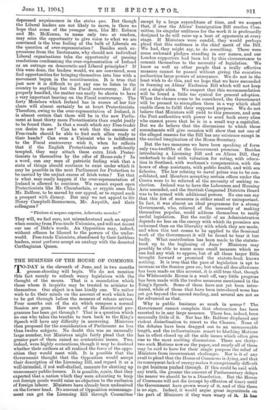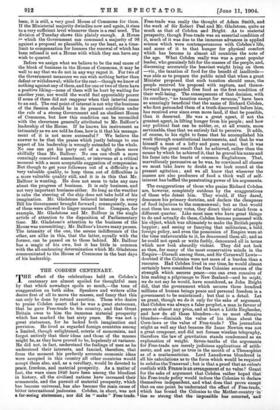T O-DAY is the eleventh of June, and in two months
grouse-shooting will begin. We do not mention this fact merely to refresh weary legislators with the thought of the moors. That is a consolation which those whom it inspirits may be trusted to minister to themselves. Our object is a less kindly one. We rather wish to fix their minds on the amount of work which has to be got through before the moment of release arrives. Four months out of the six which compose a normal Session are gone. How much of the Ministerial pro- gramme has been got through ? That is a question which no one who takes the trouble to turn back to the King's Speech will have any difficulty in answering. Ministers then proposed for the consideration of Parliament no less than twelve subjects. No doubt this was an unusually large number, but Ministers might fairly plead that the greater part of them raised no contentious issues. Two, indeed, were highly contentious, though it may be doubted whether their authors at all realised the force of the oppo- sition they would meet with. It is possible that the Government thought that the Opposition would accept their description of the Licensing Bill, and regard it as a well-intended, if not well-drafted, measure for shutting up unnecessary public-houses. It is possible, again, that they expected that a nation which they were educating to keep out foreign goods would raise no objection to the exclusion of foreign labour. Ministers have already been undeceived on the former head. No amount of Opposition mismanage- ment can get the Licensing Bill through Committee except by a large expenditure of time, and we suspect that, if ever the Aliens' Immigration Bill reaches Com- mittee, its singular unfitness for the work it is professedly designed to do will raise up a host of opponents at every stage. If Ministers were candid, they would perhaps plead that this unfitness is the chief merit of the Bill. We had, they might say, to do something. There were some awkward pledges standing in our names, and our London supporters had been led by this circumstance to commit themselves to the necessity of legislation. We know as well as other people that a really effective measure cannot be passed without giving the executive authorities large powers of annoyance. We do not in the least wish to do this, and we hope that we have succeeded in framing an Aliens' Exclusion Bill which will not keep out a single alien. We suspect that this recommendation will be found a little too cynical for general adoption. When the clauses come to be considered, the Government will be pressed to strengthen them in a way which shall enable them to fulfil their supposed purpose. We do not believe that Ministers will yield to this pressure, and arm the Port authorities with power to send back every alien who cannot prove that he is in a small way a capitalist. But we do believe that the discussions to which these amendments will give occasion will show that not one of the alleged reasons for the Bill has any existence except in the excited imagination of the Home Secretary.
But the two measures we have been speaking of form only two-twelfths of the Government promises. Besides introducing a Licensing Bill and an Aliens Bill, they undertook to deal with valuation for rating, with educa- tion in Scotland, with workmen's compensation, with the hours of shop assistants, with public health, and with sea fisheries. The law relating to naval prizes was to be con- solidated, and Members accepting certain offices under the Crown were to be relieved of the necessity of seeking re- election. Ireland was to have the Labourers and Housing Acts amended, and the Scottish Congested Districts Board was to be armed with additional powers. No one can say that this list of measures is either small or unimportant. In fact, it was almost an ideal programme for a strong Government, who, relieved of the necessity of making themselves popular, could address themselves to really useful legislation. But the credit of an Administration depends no less on the energy with which its promises are redeemed than on the liberality with which they are made, and when this test comes to be applied to the Sessional work of the Government it will be found to' bear it but badly. What contribution has been made to the statute- book up to the beginning of June ? Ministers may possibly be able to name some small measure which no one had any wish to oppose, but of all these larger Bills brought forward or promised the statute-book knows nothing. It is true that the pace of legislation is at to increase as the Session goes on; but when all due allowance has been made on this account, it is still true that, though the Whitsuntide Recess is a week off, very little progress has been made with the twelve measures mentioned in the King's Speech. Some of them have not yet been intro- duced, while of those that have been introduced none has yet got beyond the second reading, and several are not so far advanced as that.
Why is public business so much in arrear ? The Government cannot complain that obstruction has been resorted to in any large measure. There has, indeed, been unusually little of it. Nor has Mr. Balfour displayed any violent disinclination to resort to the Closure. None of the debates have been dragged out to an unreasonable length, and the indiscriminate resort to blocking Motions has in effect closed up all the side issues which often give rise to the most exciting discussions. There are thirty- two such Motions now on the paper, and nearly all of them may be said to have for their single purpose the relief of Ministers from inconvenient challenges. Nor is it of any avail to plead that the House of Commons is dying, and that its consequent lack of energy makes it exceptionally difficult to get business pushed through. If this could be said with any truth, the greater the amount of Parliamentary delays the nearer we should be to a Dissolution. But the House of Commons will not die (except by effiuxion of time) until the Government have grown weary of it, and of this there is no sign. Indeed, it would argue great ingratitude on the part of Ministers if they were weary of it. It has been, it is still, a very good House of Commons for them. If the Ministerial majority dwindles now and again, it rises to a very sufficient level whenever there is a real need. The division of Tuesday shows this plainly enough. A House which the Government can command a majority of 98 against a proposal so plausible, to say the least, as a time- limit to compensation for licenses the renewal of which has been refused is not a House with which they can have any wish to quarrel.
Before we assign what we believe to be the real cause of the block of business in the House of Commons, it may be well to say that we do not in any way regret it. For two of the Government measures we can wish nothing better than defeat or withdrawal; while for the rest—though we know of nothing against any of them, and for one or two of them have a positive liking—none of them will be hurt by waiting for another year, nor would the world feel appreciably poorer if some of them did not reappear when that interval came to an end. The real point of interest is not why the business of the Session should be in its present condition under the rule of a strong Government and an obedient House of Commons, but how this condition can be reconciled with the cleverness generally attributed to Mr. Balfour's leadership of the House. If he knows his instrument as intimately as we are told he does, how is it that his manage- ment of it is not more successful ? We believe the answer to be that the praise which justly belongs to one aspect of his leadership is wrongly extended to the whole. No one can get his party out of a tight place more skilfully than Mr. Balfour. No one can .draft a more cunningly conceived amendment, or intervene at a critical moment with a more acceptable suggestion of compromise. But though to get your followers out of a difficulty is a very valuable quality, to keep them out of difficulties is a more valuable quality still, and it is in this that Mr. Balfour is wanting. He does not seem to take any care about the progress of business. It is only business, and not very important business either. So long as the weather is calm the steering of the ship does not take hold of his imagination. Mr. Gladstone believed intensely in every Bill his Government brought forward ; consequently, none of them were allowed to linger uncared for. Compare, for example, Mr. Gladstone and Mr. Balfour in the single article of attention to the disposition of Parliamentary time. Mr. Gladstone's attention to the business of the House was unremitting ; Mr. Balfour's knows many pauses. The intensity of the one, the serene indifference of the other, are alike in this, that the latter, equally with the former, can be passed on to those behind. Mr. Balfour has a magic of his own, but it has little in common with the all-embracing determination which Mr. Gladstone communicated to the House of Commons in the best days of his leadership.











































 Previous page
Previous page